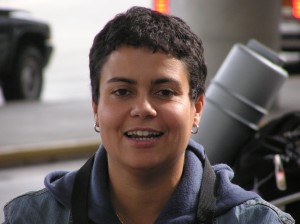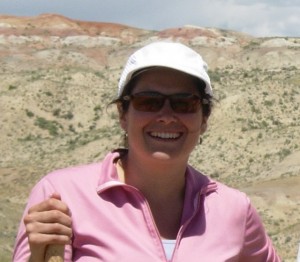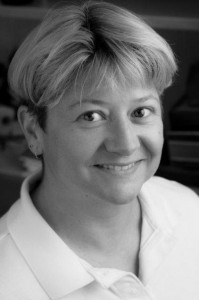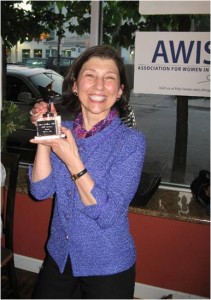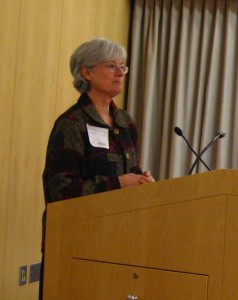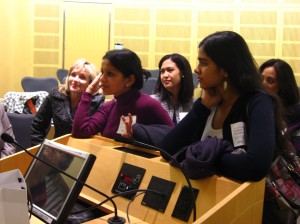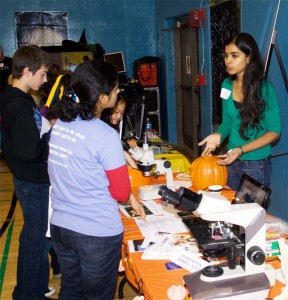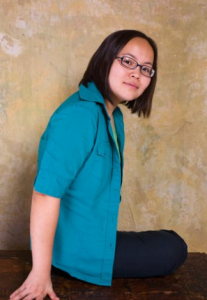 By Eunji Chung
By Eunji Chung
Louise Giam is a PhD candidate in Dr. Chad Mirkin’s group at Northwestern University. Originally from Maryland, Louise pursued her B.S. in material science and engineering at MIT before moving to Chicago. Today, Louise’s research has evolved into learning how biological functions can be tailored using nanoscaled biomaterials. Like her research, Louise is open to stepping out of familiar territories to gain interesting experiences in her personal life such as running the marathon, completing a triathlon, taking culinary classes, and attending the Olympics in South Africa. Louise continues to strive for excellence and passion both in and out of the laboratory.
EJC: Please take us through your career, from undergrad to now. How did you choose your major?/get interested in science? How was Boston and what sparked you to move to Chicago?
LG: I started college (MIT) thinking I might pursue architecture and biology, both for completely different reasons. I thought architecture might suit me since I have always been artistically inclined and believed it would merge design and purposeful engineering well. On the other hand, I had worked two of my high school summers in the late Dr. Anita Roberts’ lab at the National Cancer Institute (part of NIH) on some proteins involved in the TGF-b signaling pathway. I thought biology was fascinating, but hesitated to choose it as my major since research proceeded rather slowly and was so specific.
We had to fulfill a chemistry requirement, and rather than doing the traditional chemistry class, I ended up taking the version taught by the materials science department. The professor who taught that core class always ended the last five minutes of each lecture with some real world application of what we had learned—whether it pertained to winemaking or rubber tires—and really engaged my interest in this applied view of chemistry and physics. It was definitely different and unconventional from classic chemistry. Furthermore, I ended up choosing to major in materials science and engineering since I felt like it uniquely combined fundamental and applied science to real world challenges. This major offered many tangible opportunities to explore ideas ranging from drug-delivery polymers to efficient solar cell designs to glass sculptures since after all, everything is made up of some kind of material.
When I was looking at graduate schools, my dad gave me some advice about expanding my horizons, meeting new professors, and learning about other ideas beyond what I had seen at MIT which was why I decided to go to Northwestern.
EJC: I know you work with a relatively novel field: nanotechnology. What is your lab like in graduate school? What kind of research do you do (be specific)? What have you learned through the opportunities in your lab (besides research) by joining a larger-sized lab?
LG: I chose the Mirkin group because the research was at the forefront of nanotechnology and truly represented an interdisciplinary approach to science. I also respected the fact that Chad was not complacent about the research achievements, but kept pushing the lab in interesting fundamental and applied directions that are important to learn about. My adviser, Chad Mirkin, is a professor in multiple departments: chemistry, materials science, biology, biological and chemical engineering, and even medicine. What is great about these appointments is that the students and postdocs in our lab come from many backgrounds and not only can you learn a lot, but you can approach scientific challenges with combined expertise. I would advise others to also take chances when surrounded by others with knowledge beyond your expertise. It is a great way to learn and expand yourself, both in the science itself and the way you approach solving scientific problems.
For instance, our lab is divided into four subgroups: biomaterials, anisotropic nanomaterials, organometallic chemistry, and nanolithography, where I work. This field is relevant to the miniaturization of electronic devices, but also to patterning biomolecules (e.g. DNA, proteins) on surfaces. Specifically, I use tools which rely on a nanoscale tip coated with ink to fabricate nanopatterns of various materials (e.g. small molecules, proteins, and polymers). It is analogous to quill pens dipped in ink that are then used for writing. Most recently, I have been focused on the controlled synthesis of cadmium sulfide semiconductor nanoparticles and on understanding how patterns of fibronectin, an extracellular matrix protein, dictate stem cell differentiation down osteogenic (bone-like) lineages.
EJC: What do you think of nanotechnology and its significance in the present/future? I once heard that Chicago could be the next “Silicon Valley” for nanotechnology-how true do you think that is in terms of the relevance of nanotechnology?
LG: Just like quantum mechanics and molecular biology were new areas of research 50-60 years ago, I think nanotechnology will always be a developing area of science. “Nano” really just refers to a length scale, and many fields including biology, chemistry, and physics are studying phenomena in this range. If you think about it, proteins in our body are a few nm in diameter; transistors in our laptops or phones can also be tens of nm in one dimension.
Chicago could definitely be a hub for entrepreneurship; not only are there excellent research institutions, but the local government has encouraged nanotechnology start-ups that can grow alongside or partner with large corporations (pharmaceutical, electronic devices, finance) in the area.
EJC: Like most places of science, the gender ratios are uneven in our work places. What is your approach or attitude towards this truth and how do you think you have used it towards your advantage?/do you think it is a positive thing? What kind of support system do you have?
LG: I realize the ratios are not even, but at the same time, I do not expect or hope to be treated differently. In general, if you demonstrate leadership, competency, and command respect of others, I do not think the male-female issue is what people consider first when meeting a female researcher. I have, however, heard women claim there are few female role models they can look up to; while this observation may be true, I think there are supportive male advisors who are strong proponents of their female students advancing their careers.
Within graduate school, I definitely have both female and male friends. I try not to think of these relationships as strictly black and white where girls only understand one aspect of my life and guys relate to another aspect. I think in both personal and professional matters, I get input from family, friends, and even relevant acquaintances.
EJC: How do you balance personal life and career? What do you do to relax? What do you do on the weekends? Do you have hobbies?
LG: My first year of graduate school was characterized by long days in lab and lack of work-life separation, which inevitably led to overall unhappiness with science and graduate school. I decided that living in Evanston was not for me and so moved to downtown Chicago, where on any given night, there were options to do many non-science things: restaurants, concerts, etc. I found roommates who were medical students, and it was great sharing day-to-day experiences. Just because you are not in lab does not mean you cannot learn something new that may someday help your career. So in that vein, I enjoy hanging out with friends, but also meeting new people through volunteering and organizing young alumni events. I really think physical exercise helps balance mental exertion from lab, so used to run and bike regularly when I was training for the marathon or triathlon. I love to cook and eat with friends, and am otherwise pretty normal in that I enjoy watching television shows and movies I borrow from the library. I enjoy music ranging from Lady Gaga to classical guitar and wish I could travel more often; luckily I had the opportunity to go with friends to Amsterdam, Egypt, and South Africa last year.
EJC: Now as a senior graduate student, what kind of lessons have you learned that you would want to advise younger scientists? If there was one thing you would advise younger (women audience) scientists, what would it be?
LG: Try not to take things for granted; a corollary to this lesson may be to not develop an attitude of entitlement. This advice applies to many things. People, whether they may be older students or random strangers, are not obligated to help you; when they do, remember to be thankful, and if possible, try to pay it forward and be generous towards others. Similarly, I feel that as graduate students we sometimes take our youth and freedom for granted. While there may be pressure to constantly be in lab late hours and on weekends, have some fun and do not feel guilty for doing so. Make new friends and explore different activities; these experiences allow you to figure out who you are, what you like and do not like.
EJC: What kind of career goals do you see in the future? Take us through your decision-making process. Why does it resonate with you?
LG: Right now I am leaning towards finding a postdoc and pursuing an academic track; I note that this path is what I had considered much earlier in graduate school, but had lost sight of more recently when I received an attractive offer from a well-known semiconductor device company. At the end of the day, what you value matters most; as others far wiser than me said, “Do what you love, and everything else will come in due time.” I do not think that money should be the sole reason to do something, and perhaps in that regard, I am fortunate to be able to pursue science. I think it is exciting to create new knowledge and figured that while I am still early in my career, it is possible to take more risks and see if I can address some scientific questions or challenges.
Louise and I met back in early 2008 when I rotated in the Mirkin group. She was cool, calm, open, and friendly in the way she approached both science and life, and she continues to be consistently this way. Without taking herself too seriously, she manages to climb to great scientific benchmarks and continues to test new waters and horizons within her own life. This reflects the type of person Louise has been and how I envision her always: someone who can manage and multitask well without that (that being ambition) being the only goal and only defining characteristic. Louise is curious by nature and allows passion to lead, evolve, and bring success naturally to her life. Since early 2008, Louise and I have become great friends and have had countless discussions about science, life, and the life of a scientist over coffee or brunch. It’s always a great time-to further your own scientific knowledge, like Louise mentioned, with scientists beyond your own discipline and to do it in new and great eateries within Chicago. Recently, we went to check out Longman and Eagle in Logan Square.
*Know a scientist you think should be featured in an upcoming “Scientist of the Month” article? Submit your nomination here. Your nominee does not need to be an AWIS member or a woman, but should promote the advancement of women in science, technology, mathematics and engineering.
Want to keep yourself up-to-date on AWIS Chicago activities? Follow AWIS Chicago on Twitter! You can request to be added to our listserve by clicking here, and join the AWIS Chicago group on LinkedIn and Facebook by clicking the icons on the bottom right of this page.

